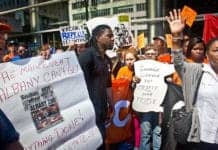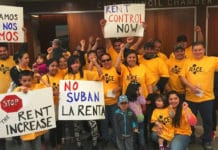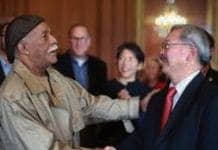How the Richmond Progressive Alliance broke Chevron’s stranglehold and birthed political superstar Jovanka Beckles
Review by Matthew Cunningham-Cook
Richmond, California, stands in a Bay Area gone haywire: going from a relative oasis of working-class power to the most unequal region in the country in a period of 25 years. Driven by an insurgent Silicon Valley financed by massive government and investor subsidies, the Bay Area is today a playground for the rich.

It’s an evil paradise that preys on the most vulnerable populations – working-class people, Black and Chicano people, Chinese and Filipino; the homeless, the gender variant, women and children – ruled, in turn, by a venal digital and real estate elite.
With a homeless population of nearly 7,000 and the average home price of $710,000, San Francisco in particular is a parody of the grotesque. The “liberal” city’s homeless rate makes it among the highest in the country. Forty-one homeless people died in 2015.
Meanwhile the portfolios of the tech and real estate titans are up – way up. Those “profits” are in actuality monopoly rents and are a product of active governmental intervention: The wealth of the titans is driven by pension funds like CalPERS that finance the insanely large valuations of Amazon, Google, Apple and Facebook.
So too does the industry benefit from expansive federal contract support: The region as a whole is flush with CIA (via the agency’s in-house venture capital firm In-Q-Tel), NSA and Pentagon money in their attempt to develop fully autonomous robocops that usher in the apocalypse of late-capitalist techno-fascism. But given the cast of frauds and hucksters that ignites Silicon Valley, the main thing the industry actively does beyond collecting and selling data is drive the most inflated real estate bubble in North America.
Fortunately for Richmond, the city lacks a confluence of Silicon Valley firms. What Richmond has, however, is Chevron. The largest oil refinery in California has made much of Richmond less attractive to real estate speculators, making the city one of the last vestiges of significant working-class homeownership in the Bay Area.
Relative to San Francisco ($77,734) and Oakland ($52,962), Richmond has a median household income of just $44,210. And while the rest of the Bay Area has seen no concrete government-led effort to reign in skyrocketing housing costs, Richmond became the first city in a generation to pass rent control.
Fortunately for Richmond, the city lacks a confluence of Silicon Valley firms. What Richmond has, however, is Chevron. The largest oil refinery in California has made much of Richmond less attractive to real estate speculators, making the city one of the last vestiges of significant working-class homeownership in the Bay Area.
That rent control campaign, led by the nonsectarian Richmond Progressive Alliance, has made the city just one of a handful experimenting with a new form of municipal governance, centered on human needs as opposed to control by the rich. Radically differentiating from the pro-developer-at-any-cost policies that characterize Oakland, San Francisco and San Jose, Richmond’s leadership is at the forefront of voices that argue that another Bay Area is possible.
The story of how the RPA took power – as of November 2016 with 5 of 7 seats on a weak-mayor city council – is eloquently and lucidly described by veteran trade unionist and labor journalist Steve Early. Early moved to Richmond late in life, but has now produced a compelling work that describes the halting process of holding Chevron and the real estate lobby accountable for its frequent misdeeds by building a dynamic multiracial coalition that eschews traditional party politics.
The story of how the RPA took power – as of November 2016 with 5 of 7 seats on a weak-mayor city council – is eloquently and lucidly described by veteran trade unionist and labor journalist Steve Early.
It’s a lesson in how in the era of Trump, unions, community activists, and environmentalists can join forces to take on one of the most powerful corporations in the world – and win.
***
Steve Early’s “Refinery Town” begins with an explosion at Chevron on Aug. 6, 2012, that led more than 15,000 Richmond residents to seek medical care for respiratory issues. The explosion, which injured 19 workers, was an open-shut case of negligence on Chevron’s part.
Early makes the case that Chevron’s refinery – at one time the third largest in the world – has more or less defined Richmond’s history. And in the past 30 years in particular, Chevron’s safety and health issues have been a central issue for the City.
Steve Early’s “Refinery Town” begins with an explosion at Chevron on Aug. 6, 2012, that led more than 15,000 Richmond residents to seek medical care for respiratory issues.
Early quotes a Richmond-based environmental activist who points out that from 1989 to 1995 alone, Chevron had more than 300 reported accidents at the factory, including “major fires, spills, leaks, explosions, toxic gas releases, flaring, and air contamination.” In March 1999, the refinery “released a huge plume of sulfur dioxide smoke.” And in January 2007, the refinery had a five-alarm fire that burned for nine hours, in an event that injured two workers.
According to Early, Chevron rakes in approximately $2 billion annually from Richmond. The city’s port seems uniquely able to meet growing demand from China.
Revealing his internationalist credentials, Early cites the example of Ecuador early on to show Chevron’s commitment to avoiding accountability: Despite a judgment against it, Chevron has spent over $2 billion to avoid paying what it owes. That example is a sobering reality for Richmond progressives, eager to hold Chevron accountable for the hundreds of millions of dollars in damages that Chevron has incurred against the public health of the city’s population.
The Richmond Progressive Alliance grew out of campaigns that worked to address the high levels of pollutants in Richmond, like a proposed oil-burning municipal power plant in 2001. By 2004, they had elected one of their own to the City Council: Gayle McLaughlin, a white Green Party member who quickly became the voice for expanded regulation of Chevron on the City Council.

In 2006 the RPA elected McLaughlin mayor by 279 votes. She quickly expanded her advocacy from the City Council, successfully organizing to win new taxes and fees on Chevron. In 2010 McLaughlin was reelected and joined by Jovanka Beckles, an LQBTQ Black woman who was the RPA’s first candidate of color to win.
After a trip to Ecuador in 2013, McLaughlin displayed a sentiment wildly out of step with the mayors of company towns nationwide: “Chevron is not only polluting our air and water. They’re polluting our politics and legal system. So we’re building an international ‘union of affected people’ that can turn our shared pain and suffering into the power to change things.”
Increasingly frustrated with the results from Richmond’s City Hall, Chevron’s clients on the City Council launched a wildly homophobic filibuster campaign, with a rambunctiously nonproductive City Hall atmosphere. Chevron allies Nat Bates and Courtland “Corky” Booze launched one character attack after another at Beckles and McLaughlin, with the goal being to sabotage their brand heading into their 2014 reelection campaigns.
In 2014 the company launched their most expansive public relations campaign ever, a $10 million-plus campaign to rehabilitate the company’s image as they proposed an expansion to the refinery. This involved purchasing nearly every billboard in the city, plastering the public with ads about the company’s “safety” record.
They were financing five-decade councilman African-American Nat Bates’ campaign for mayor. The success of Chevron’s PR campaign was intimately correlated with the success of Bates’ 2014 campaign. While McLaughlin was term-limited and as a result was running again for City Council, a victory for Bates in the race for mayor would rid Chevron of its biggest roadblock in government.
Chevron would end up spending $3.1 million against the RPA candidates for City Council in 2014 – and all three of them won, in addition to Tom Butt, the less-progressive fellow challenger who ran an independent candidacy conditionally supported by the RPA. “Chevron spending in Richmond in 2014 equaled the total amount it devoted to congressional races in 2012 and 2014 throughout the country.”
But ultimately the RPA was able to force Chevron to heel, making it pay far more than initially planned for it to go forward with its refinery “modernization” process. The RPA was able to get every item on its bucket list – expanded safety protections at the refinery and higher taxes – except for a proposed bailout of a public hospital. (The RPA’s erstwhile ally Tom Butt was not exactly helpful on this front.)
And the RPA kicked Chevron’s behind at the ballot box, electing Tom Butt and three RPA councilors – McLaughlin, Beckles and Eduardo Martinez. That set the stage for the historic rent control campaign.
But ultimately the RPA was able to force Chevron to heel, making it pay far more than initially planned for it to go forward with its refinery “modernization” process. The RPA was able to get every item on its bucket list – expanded safety protections at the refinery and higher taxes – except for a proposed bailout of a public hospital.
It is in Early’s discussion of the rent control campaign that his narrative becomes fully engaged. One Richmond attorney helped seed the campaign early on, by noting that prominent real estate interests were planning to make Richmond the new Oakland.
Oakland, with its mass of foreclosures and a mayor acting as a wholly-owned subsidiary of the real estate lobby, was not exactly appealing for Richmond residents. While there were some hiccups along the way, by November 2016 Richmond had passed comprehensive rent control.
Initially the RPA had passed it through the City Council. Mayor Tom Butt, who the RPA had supported in 2014, was apoplectic. More so was the California Apartment Association, a front group for gentrifiers that first forced the issue onto the ballot and then mounted a series of legal challenges to the ordinance. To this day the implementation of the ordinance is highly contested by both Butt and the CAA.
And the RPA kicked Chevron’s behind at the ballot box, electing Tom Butt and three RPA councilors – McLaughlin, Beckles and Eduardo Martinez. That set the stage for the historic rent control campaign.
The passage of rent control was only possible through the RPA’s mobilization of allies – unions like the California Nurses Association, AFSCME 3299, CWA 9119 and SEIU 1021 and community allies like the Alliance of Californians for Community Empowerment (ACCE). The RPA deftly ran a class politics-based campaign that was wildly successfully with voters. They mobilized an issue to get their candidates elected and win a majority on the City Council for the first time.
The rent control campaign, combined with the victories over Chevron, is historic in and of itself. They represent a massive set of victories by a ragtag community group – stories worth telling across the nation.
But that’s not to say there aren’t hicccups. On his discussion of the RPA’s 2012 proposed soda tax campaign, for example, Early attributes all opposition to “astroturfing.” But astroturfing was only possible because of legitimate fears around regressive taxation.
While the money from the soda tax campaign could have been useful, the African-American and Latino community quite possibly saw the enormous salaries that the city was paying to the majority-white police and fire forces and asked – can’t the city get money for public health from somewhere else?
Certainly the soda tax campaign was a huge tactical blunder, resulting in the strengthening of Chevron’s influence on the City Council. Only when the RPA returned to goals that did not result in higher taxes on working people did its slates succeed, as in 2014 and 2016.
Likewise, Early’s discussion of now-former police chief Chris Magnus is effusive. Magnus was successful at reducing crime in the city by advocating community engagement as opposed to SWAT team tactics. He did that by taking on what Early describes as a “cowboy” culture within the department, where military swagger led to a predatory relationship with the city’s communities of color.
There are a few concerns about Magnus’ record, however, and “Refinery Town” could stand to be a little more sober about Magnus’ limitations. Early cites Magnus’ record of getting 26 women police officers on a 140-member force as significant. But Magnus had the opportunity to “personally select” 90 officers. Why the skewed gender breakdown, then?
Magnus’ implicit defense of the police murder of Richard Pedro Perez III is stomach-churning, and his bragging of “only” two officer-involved shootings in the previous 10 years – not to mention “only” 25 cop-initiated taser “incidents” in 2014 – is taking credit for numbers that in any civilized society are way too high.
What is clear, however, is that without the work of the Richmond Progressive Alliance, Richmond would be a much more difficult place to live. Ordinary people came together, took over their city government and made change for the working-class.
It’s a deeply inspiring story, chronicled by one of the nation’s most sensitive, talented, critical and committed observers of the labor movement and municipal politics. It’s a story that needs to be replicated all across the country, from big cities to small counties, from company towns to college towns.
In the 2016 elections, the RPA soared to new heights, winning five out of the seven seats on the City Council. The city’s rent control has gone into effect.
Without the work of the Richmond Progressive Alliance, Richmond would be a much more difficult place to live. Ordinary people came together, took over their city government and made change for the working-class.
In 2018, the RPA is taking its activism to an even higher level. RPA Councilwoman Beckles is running a grassroots campaign for the California Assembly, backed by a vibrant coalition including unions SEIU, UPTE/CWA Local 9119, the Teamsters and the National Union of Healthcare Workers (NUHW) and organizations like Our Revolution, the Democratic Socialists of America, the Alliance of Californians for Community Empowerment (ACCE) Action and prominent activists like Bobby Seale, Ericka Huggins, Danny Glover, Tom Ammiano and of course the RPA itself.
Beckles’ election would send an extremely clear message to the Chevrons and slumlords of the world that the Bay Area isn’t taking its “transformation” lying down.
Matthew Cunningham-Cook, a labor researcher and writer living in Prince George’s County, Maryland, can be reached at m.cunninghamcook@gmail.com.

 Store
Store








